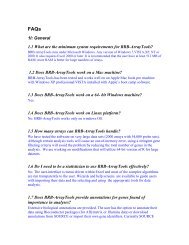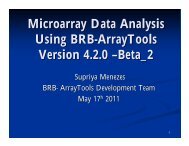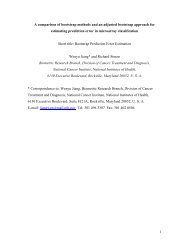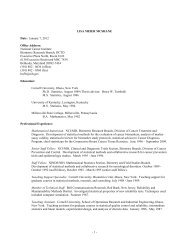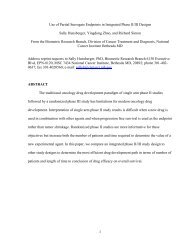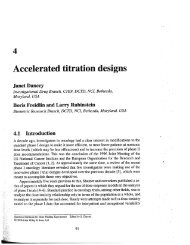Identification of Pharmacogenomic Biomarker Classifiers in Cancer ...
Identification of Pharmacogenomic Biomarker Classifiers in Cancer ...
Identification of Pharmacogenomic Biomarker Classifiers in Cancer ...
Create successful ePaper yourself
Turn your PDF publications into a flip-book with our unique Google optimized e-Paper software.
with a strong biological rationale l<strong>in</strong>ked to the mechanism <strong>of</strong> action <strong>of</strong> the drug is more<br />
satisfy<strong>in</strong>g than a “black box” classifier. Second, development time is likely to be shorter,<br />
and f<strong>in</strong>ally a reproducible assay for a s<strong>in</strong>gle gene/prote<strong>in</strong> biomarker may be<br />
implementable on a platform that does not require fresh/frozen tumor.<br />
Mutation-targeted drugs are drugs which are specific to a mutated gene which is driv<strong>in</strong>g<br />
the growth <strong>of</strong> a tumor. For example, there is currently considerable <strong>in</strong>terest <strong>in</strong> develop<strong>in</strong>g<br />
drugs specific for mutated B-raf which is present <strong>in</strong> approximately 60 percent <strong>of</strong> human<br />
melanomas. Such drugs have automatic pharmacogenomic biomarkers based on assay<strong>in</strong>g<br />
for the presence <strong>of</strong> the mutation. In general, the mutation could either be a po<strong>in</strong>t mutation<br />
as <strong>in</strong> B-raf, gene amplification, or deletion.<br />
Many current cancer drugs are selected to <strong>in</strong>hibit oncogenes that are mutated <strong>in</strong> some<br />
tumors. Although the drugs are not designed to be specific for the mutated forms <strong>of</strong> the<br />
associated prote<strong>in</strong>s, presence or absence <strong>of</strong> a mutation can be used as a natural<br />
pharmacogenomic biomarker <strong>of</strong> the patients most likely to benefit from the drugs.<br />
Papadopoulous et al review the experience with molecularly targeted drugs <strong>of</strong> this type<br />
{Papadopoulos, 2006 #287}.<br />
Although all chemotherapeutic drugs are “molecularly targeted” <strong>in</strong> the sense that they<br />
<strong>in</strong>teract with specific <strong>in</strong>tracellular components {Papadopoulos, 2006 #287}, <strong>in</strong> some<br />
cases the true target is not known when the drug is developed, <strong>in</strong> some cases there are<br />
multiple targets, and <strong>in</strong> many cases there is no obvious assay for determ<strong>in</strong><strong>in</strong>g the extent to<br />
4



